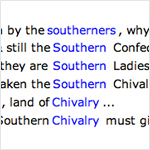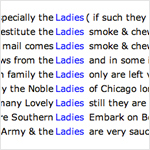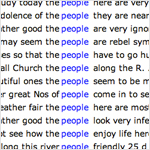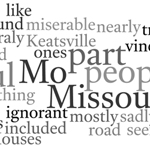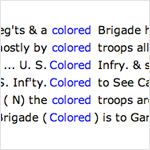The People
Links to the evidence referenced in this analysis appear in the sidebar to the left and within the analysis text. Simply click on a link (e.g. Figure iii) and a screen will pop up to display the visualization.
The Southern people receive frequent attention from Alcander. They appear largely as ignorant and uncivilized rebels, incapable of properly managing their lush farmlands or conducting themselves as proper ladies. The words he chooses to describe Southerners indicates that he associates both civilians and soldiers with their act of rebellion. (See Figure 2 and Figure 3.) The mutinous South is facetiously associated with the archaic notion of chivalry, but not its own separate political entity. Only once is the word "Confederacy" used. (See Figure iii and Figure 1.) Southerners are rarely referred to by their regional name. Instead, Alcander calls them "Rebels" or "Secesh." Only once is "South" used to refer to the section of the country; all other instances are directional. (See Figure 5.) It is clear from these rhetorical choices that Alcander understood the South as an insubordinate section of an indivisible Union.
Any harm these rebellious citizens incurred, Alcander believed, was brought upon themselves. Following the Battle of Prairie Grove, Arkansas (a Union victory), Alcander surveyed the ruined landscape. "go to the Secesh Hospitals[;] it is a very hard sight[.] all unkind feelings vanish as one looks upon those poor suffering men[.] it is true they brought it upon themselves[,] still it looks hard to see them suffer so." Alcander's comment that the Southerners "brought it upon themselves" is reminiscent of General William Tecumseh Sherman's infamous line: "You cannot qualify war in harsher terms than I will. War is cruelty, and you cannot refine it; and those who brought war into our country deserve all the curses and maledictions a people can pour out."
The female residents of the South appear often in the journal and inspire some humorous remarks. (See Figure ii and Figure 4.) As he travels through Arkansas in the process of clearing the enemy from southern Missouri, he finds that the women there do live up to his expectations of what a lady ought to be. "people are very destitute through this section of the country[.] mostly Seceshionests[,] especially the Ladies (if such they may be called[,] which I doubt)." A few days later he reports, "the people here are very ignorant & destitute[.] the Ladies smoke & chew tobacco & swear like pirates." The womanhood of Southern ladies is called into question due to their penchant for tobacco and coarse language, but also their ardent secessionism. A later encounter with Arkansan women reveals the antagonism between Southern women and the Northern troops, and suggests perhaps that aggressive patriotism impairs the womanhood of these Southern ladies in Alcander's eyes. "this section of the State is very thinly settled & what there is are not very wealthy people[.]the men are mostly in the Rebel Army & the Ladies are very saucy to us Northern Mudsills, who came here (they say) to rob & burn their Houses & rob them of their rights."
Alcander records equally as unflattering opinions of the Southern population at large. (See Figure v.) The words "ignorant" and "destitute" are the adjectives typically used to describe the peoples he encounters. For example, while foraging near Bentonville, Arkansas, he notes, "apples are plenty but owing to the indolence of the people[,] they are nearly all spoiled by the frost." His hostilities are also directed toward Missouri and its citizens, even those loyal to the Union. (See Figure I.) He frequently criticizes soldiers from Missouri, referring to them as "our (miserable) Missouri troops" or as "pour excuse for Soldiers."
Despite its importance in the genesis of the war, issues of race are remarkably absent in Alcander's journal. African Americans are only referenced in regard to their presence in the Northern military. (See Figure vii.) Only one passing observation of the peoples along the Mexican-American border of Texas alludes to race. "the people look very inferior[,] very dark &.c."



